高中英语必修5unit 3 学案 教案 (含答案)
2019-2020年高中英语人教版必修五教学案:Unit 5 Section Ⅲ(含答案)
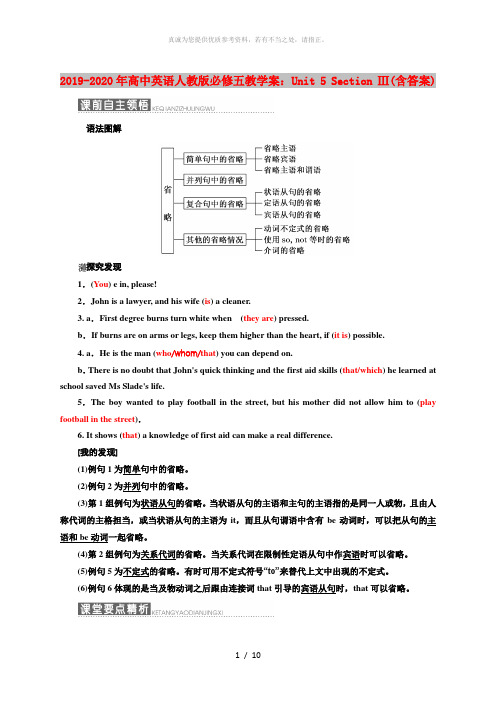
2019-2020年高中英语人教版必修五教学案:Unit 5 Section Ⅲ(含答案)语法图解探究发现1.(You) e in, please!2.John is a lawyer, and his wife (is) a cleaner.3. a.First degree burns turn white when (they are) pressed.b.If burns are on arms or legs, keep them higher than the heart, if (it is) possible.4. a.He is the man (who/whom/that) you can depend on.b.There is no doubt that John's quick thinking and the first aid skills (that/which) he learned at school saved Ms Slade's life.5.The boy wanted to play football in the street, but his mother did not allow him to (play football in the street).6. It shows (that) a knowledge of first aid can make a real difference.[我的发现](1)例句1为简单句中的省略。
(2)例句2为并列句中的省略。
(3)第1组例句为状语从句的省略。
当状语从句的主语和主句的主语指的是同一人或物,且由人称代词的主格担当,或当状语从句的主语为it,而且从句谓语中含有be动词时,可以把从句的主语和be动词一起省略。
(4)第2组例句为关系代词的省略。
当关系代词在限制性定语从句中作宾语时可以省略。
2021-2022学年人教版高中英语必修三教学案:Unit 5 Section 3 Word版含答案
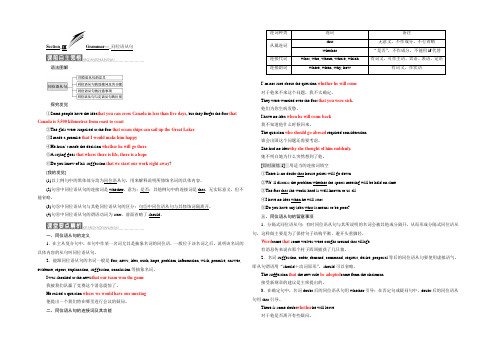
Section_ⅢGrammar—_同位语从句语法图解探究发觉①Some people have the idea that you can cross Canada in less than five days, but they forget the fact that Canada is 5,500 kilometres from coast to coast.②The girls were surprised at the fact that ocean ships can sail up the Great Lakes.③I made a promise that I would make him happy.④He hasn't made the decision whether he will go there.⑤A saying goes that where there is life, there is a hope.⑥Do you know of his suggestion that we start our work right away?[我的发觉](1)以上例句中的黑体部分均为同位语从句,用来解释说明所修饰名词的具体内容。
(2)句④中同位语从句的连接词是whether,意为:是否;其他例句中的连接词是that,无实际意义,但不能省略。
(3)句⑤中同位语从句与其他同位语从句的区分:句⑤中同位语从句与其修饰词隔离开。
(4)句⑥中同位语从句的谓语动词为start,前面省略了should。
一、同位语从句的定义1.在主从复合句中,在句中作某一名词尤其是抽象名词的同位语,一般位于该名词之后,说明该名词的具体内容的从句叫同位语从句。
2.能跟同位语从句的名词一般是fact, news, idea, truth, hope, problem, information, wish, promise, answer, evidence, report, explanation, suggestion, conclusion等抽象名词。
新课标人教版必修5 unit3 学案(含答案)
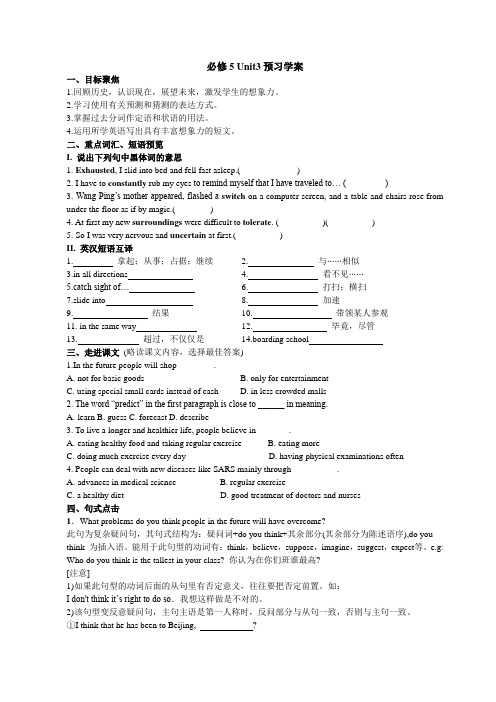
必修5 Unit3预习学案一、目标聚焦1.回顾历史,认识现在,展望未来,激发学生的想象力。
2.学习使用有关预测和猜测的表达方式。
3.掌握过去分词作定语和状语的用法。
4.运用所学英语写出具有丰富想象力的短文。
二、重点词汇、短语预览I. 说出下列句中黑体词的意思1. Exhausted, I slid into bed and fell fast asleep.( )2. I have to constantly rub my eyes to remind myself that I have traveled to… ( )3.Wang Ping’s mother appeared, flashed a switch on a computer screen, and a table and chairs rose from under the floor as if by magic.( )4. At first my new surroundings were difficult to tolerate. ( )( )5. So I was very nervous and uncertain at first.( )II. 英汉短语互译1. 拿起;从事;占据;继续2. 与……相似3.in all directions4. 看不见……5.catch sight of…6. 打扫;横扫7.slide into 8. 加速9. 结果10. 带领某人参观11. in the same way 12. 毕竟,尽管13. 超过,不仅仅是14.boarding school三、走进课文(略读课文内容,选择最佳答案)1.In the future people will shop ________.A. not for basic goodsB. only for entertainmentC. using special small cards instead of cashD. in less crowded malls2. The word “predict” in the first paragraph is close to ______ in meaning.A. learnB. guessC. forecastD. describe3. To live a longer and healthier life, people believe in _______.A. eating healthy food and taking regular exerciseB. eating moreC. doing much exercise every dayD. having physical examinations often4. People can deal with new diseases like SARS mainly through __________.A. advances in medical scienceB. regular exerciseC. a healthy dietD. good treatment of doctors and nurses四、句式点击1.What problems do you think people in the future will have overcome?此句为复杂疑问句,其句式结构为:疑问词+do you think+其余部分(其余部分为陈述语序),do you think 为插入语。
高中英语人教新课标必修五-Unit 3 Life in the future 学案设计(有答案)
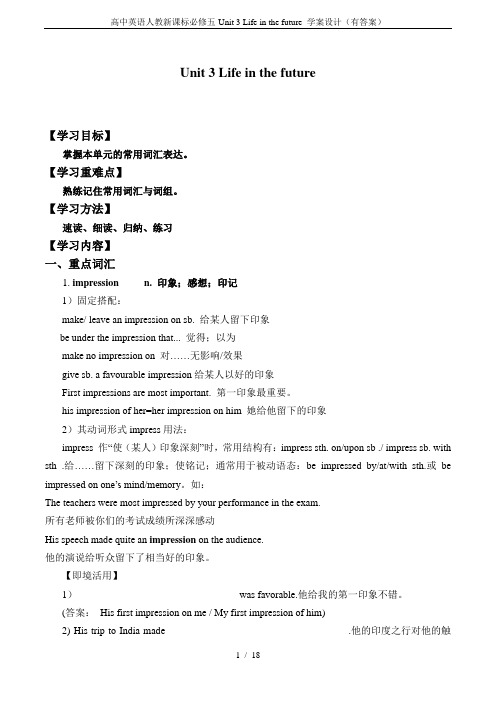
Unit 3 Life in the future【学习目标】掌握本单元的常用词汇表达。
【学习重难点】熟练记住常用词汇与词组。
【学习方法】速读、细读、归纳、练习【学习内容】一、重点词汇1. impression n. 印象;感想;印记1)固定搭配:make/ leave an impression on sb. 给某人留下印象be under the impression that... 觉得;以为make no impression on 对……无影响/效果give sb. a favourable impression给某人以好的印象First impressions are most important. 第一印象最重要。
his impression of her=her impression on him 她给他留下的印象2)其动词形式impress用法:impress 作“使(某人)印象深刻”时,常用结构有:impress sth. on/upon sb ./ impress sb. with sth .给……留下深刻的印象;使铭记;通常用于被动语态:be impressed by/at/with sth.或be impressed on one’s mind/memory。
如:The teachers were most impressed by your performance in the exam.所有老师被你们的考试成绩所深深感动His speech made quite an impression on the audience.他的演说给听众留下了相当好的印象。
【即境活用】1)________________________________ was favorable.他给我的第一印象不错。
(答案:His first impression on me / My first impression of him)2) His trip to India made ____________________________________.他的印度之行对他的触动很大。
英语必修5Unit 3学案答案
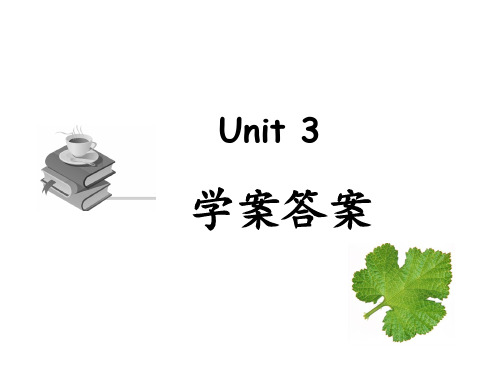
五.语法填空。 surprised Shocked 1.______ (shock) at what he said, his mother stood there _______ (surprise). Seeing 2. ______ (see) from the top of the mountain, we can see the whole city. See 3._______ (see) from the top of the mountain and you’ll find our city so beautiful. 4._______(see) from the top of the mountain, the city looks more Seen beautiful. Seated 5. _______(seat) at the table, my father and I were talking about my job. Lost 6. ______(lose) in thought, he almost ran into the car in front of him. 7.When completed (complete), the museum will be open to public. ______ 8.After his journey from abroad, Mr. Smith returned home, exhausted (exhaust) ______ Beaten 9.________(beat) by the opponent(对手), they were not discouraged _______ (discourage) and practiced even harder. 10.Notknowing (know) where the station is, he asked the policeman. ______
高一英语译林版必修5教学案:Unit 3 Section 3 含解析
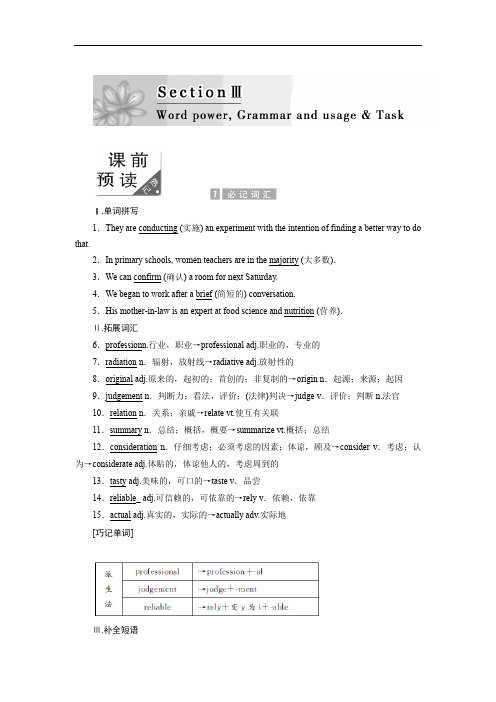
Ⅰ.单词拼写1.They are conducting (实施) an experiment with the intention of finding a better way to do that.2.In primary schools, women teachers are in the majority (大多数).3.We can confirm (确认) a room for next Saturday.4.We began to work after a brief (简短的) conversation.5.His mother-in-law is an expert at food science and nutrition (营养).Ⅱ.拓展词汇6.professionn.行业,职业→professional adj.职业的,专业的7.radiation n.辐射,放射线→radiative adj.放射性的8.original adj.原来的,起初的;首创的;非复制的→origin n.起源;来源;起因9.judgement n.判断力;看法,评价;(法律)判决→judge v.评价;判断n.法官10.relation n.关系;亲戚→relate vt.使互有关联11.summary n.总结;概括,概要→summarize vt.概括;总结12.consideration n.仔细考虑;必须考虑的因素;体谅,顾及→consider v.考虑;认为→considerate adj.体贴的,体谅他人的,考虑周到的13.tasty adj.美味的,可口的→taste v.品尝14.reliable_ adj.可信赖的,可依靠的→rely v.依赖,依靠15.actual adj.真实的,实际的→actually adv.实际地[巧记单词]Ⅲ.补全短语1.turn out证明(是);结果(是)2.figure out 想出,理解;弄清楚;计算出,演算出3.be similar to 与……相似4.put ... in place 把……准备就绪,布置妥当5.in summary 总之,概括地说6.compared with 与……相比较7.follow in one's footsteps 效仿某人8.in the field of 在……领域9.the same as 与……相同10.be/get burnt out 耗尽体力,累垮11.public relations 公共关系12.take ...into consideration 认真考虑1.[教材原句]He is always working in his lab, trying to figure out all the mysteries that make him puzzled.他总是在实验室里工作,努力弄明白困惑他的所有奥秘。
2021-2022学年高中英语人教版必修五教学案:Unit 3 Section Ⅲ Word版含答案
Section_ⅢGrammar—_过去分词作状语语法图解探究发觉1.①Worried about the journey, I was unsettled for the first few days.②Given better attention, the trees could grow better.③Described as an enormous round plate, it spins slowly in space to imitate the pull of the earth's gravity.2.①Hit by a lack of fresh air, my head ached.=Because I was hit by a lack of fresh air, my head ached.②I stared at the moving model of the waste machine, absorbed by its efficiency.=I stared at the moving model of the waste machine, and was absorbed by its efficiency.3.①When offered help, one often says “Thank you” or “It's kind of you.”②The research is so designed that once begun nothing can be done to change it.[我的发觉](1)作状语用的过去分词(短语)和句子的主语之间有规律上的动宾关系,或称为被动关系。
(2)第一组句子中的过去分词(短语)分别在句子中作:①缘由状语;②条件状语;③伴随状况或方式状语。
(3)比较其次组句子可知,作状语用的过去分词(短语)可以转化成相应的状语从句或并列句。
人教版高中英语必修5教案Unit 3 Life in the Future
人教版高中英语必修5教案Unit 3 Life in the Future Unit 3 Life in the FutureTeahing Gals:Tpi:Prediting the gd and bad hanges in the futureiagine the alien reaturesUseful expressins::tae up 拿起;接受;开始;继续reind…f… 使回想起或意识到lse sight f… 不再看见… … ath sight f… 瞥见seep up 打扫;横扫speed up 加速assist in 帮助;援助;协助Sentene strutures:I still annt believe that I a taing up prize that as n last earrried abut the urne, I as unsettled fr the first fe dasnfused b the ne surrundings, I as hit b the la f fresh airSn I as ba n feet again and flled hi t llet a hvering arriage driven b puterDesribed as an enrus rund plate, it spins sll in spae t iitate the pull f the earth’s gravit…a table and hair rse fr under the flr as if b agiGraar:1过去分词作定语(The past partiiple as the attribute)I flled hi t llet a hvering arriage driven b puterTrr u ill be read fr se visits rganized b puter2过去分词作状语(The past partiiple as the adverbial)rried abut the urne, I as unsettled fr the first fe dasnfused b the ne surrundings, I as hit b the la f fresh airPerid 1Teahing Ais:1 Learn se ne rds and expressins2 Help the students t tal abut life in the past, at present and in the future3 Enable the students t desribe the life in the past, at present and in the futureDiffiult and Iprtant Pints:pare life in the past, at present and in the futurehat is life in the future lie? hat hanges ill tae plae?Teahing ethds:1 First and areful reading,2 Asing and ansering questin ativit3 Individual, Pair r ≈ grup rTeahing Predures:Step 1 aring upSh the students se pitures r vides f the past and present life, and as the their first ipressins f the pitureslead-in: Tal abut h an hanges there have been in the past and in the presentStep 2: pre-reading1 an u tell hat prbles peple are faing tda?2 hat prbles d u thin peple in the future ill have vere? hih nes ill still be there r even rse in AD300? 找教案http://zhaiaane: 1 The prble f ppulatin ill be slved, have begun t ntrl the birth rate2 The prbles ill be still there, and ill even rse3 I dn’t thin s N sientists are tring their best t develp ne resures that huan beings an ae use f ,suh as slar energ In pinin…step 3:fast readingRead the text fr the first tie and tell hat the text is abut?It’s an e-ail ritten b a an h has taen up a trip t the future2 L at the flling sentene, there are in rng rder, tell e the rret rder fr these senteneA e ere transprted int the future b a frtable tie apsuleB I arrived a t ang Ping’s he and everthing in his huse ade e surprised I n a travel t the ear AD300D I have first tr t aster a hvering arriageStep 4 areful reading1 Questins ≈ ansers:1 h did I have the hane t travel t the ear AD300?2 hat is a “tie lag”?3 H did I feel hen I as in the apsule?4 h guides trip?h did guide give e se tables?6 h transprted us t the future?e 1 I t up the prize I n the ear befre2 “Tie lag” eans a persn gets flashbas fr his previus tie perid3 The seats in the apsule are ver frtable4 friend ang Ping is guide t the futureThe tablets uld help e feel less nervus and unertain 6 ang Ping’s parents’pan transprted us t the future 2 Fill in the hart:Gd hangesBad hangesTie travelan travel t Different tiesas u ishAfter-effets f travelan ve siftl Disrganized, diffiult t find ahusessave living spae Shrt f spaeBus, l liearetsEas t get lstAir qualitn failxgen supplPr qualit in publi plaes3 Reading the text t deide n the tpe f riting and suar f the ideaTpe f ritingThis is a piee f narrative ritingain idea f the passageIt tells abut Li Qiang traveling t the ear AD 300 and his experienes thereTpi sentene f 1st paragraphI have traveled t the ear AD 300Tpi sentene f 2nd paragraphI as still n the earth but ne thusand ears in the future Tpi sentene f 3rd paragraphI as hit b the la f fresh airTpi sentene f 4th paragraphTrr I ill be read fr ther visits rganized b “ Future Turs”4 aing a hain f events fr the text First Ipressins Suffering fr “tie lag”Ging b a tie apsulen earth but 1000 ears in the futureAt he in the ear AD 300Step : Disussin: Saple ansers Ex2I thin the riter has an ptiisti vie f the future He as ver exited hen he traveled t the ear AD 300 an d uldn’t believe if as true Fr this, e an see he is eager t g t the future Thugh she as hit b the la f fresh air,The 2nd ≈ 3rd peridTeahing ais:Learn expressins ≈ phrasesLearn language pintsDiffiult and Iprtant Pints:1)Language pints2)The usage f “tae up and seep”Teahing ethds:Presentatin ≈ Pratie Teahing Predures:Step I RevisinHave a ditatinStep II he the ansers1)he the ansers f esterda’s her (P42Using rds and Expressins) Step three language pintaring upaspet n 方面,外观u’ve nl nsidered ne aspet f the prbleThe fiere aspet f the salesan frightened the uster ffPre-readingvere vt 克服,战胜,找到处理问题的办法; 表示“压倒,受不了” 时, 常用被动语态;be ver e ith… “…之极, 极为… ”He verae the bad habit f singe’ll vere the diffiult hen e gt t itThe hild as vere b eariness and sleptther as vere ith griefReading1 I still an’t believe that I a taing up prize that as n last ear Tae up 开始从事,选修, 占用, 吸收hen des the anager tae up his b?he t up art in llegeHe deided t tae up phtgraph as his areerThis table taes up t uh rPlants tae up atertae 的词组tae ff 脱下, 起飞tae ver接管tae t 喜欢上,对…产生好感Helen alas helps her ther even thugh ging t shl ____ st f her daA taes upB aes up saves up D puts up找教案http://zhaiaan2I have t nstantl rub ees t reind self that I have traveled t the ear AD300 我得不断擦拭自己的眼睛提醒自己,我已到了公元300年reind: t ae sene reeber sething that the ust d这部影片使他回想起在中国所看到的一切。
普通高中英语必修5优秀教案Unit3
个人收集整理仅供参考学习人教版高中英语必修5教案Unit 3 Life in the FuturePeriod 1 Warming up and readingLearning aims:1. Learn some new words and expressions.2. Help the students to talk about life in the past, at present and in the future.3. Enable the students to describe the life in the past, at present and in the future. Important Points:To help students learn to read a narration about John Snow Difficult Points:To help students learn to describe peopleTeaching Procedures:Step 1 warming upShow the students some pictures or videos of the past and present life, and ask them their first impressions of the pictures.lead-in: Talk about how many changes there have been in the past and in the present.Step 2: pre-reading1. Can you tell what problems people are facing today?2. What problems do you think people in the future will have overcome? Which ones will still be there or even worse in AD3005?Key: 1. The problem of population will be solved, have begun to Control the birth rate.2. The problems will be still there, and will even worse.3. I don't think so. Now scientists are trying their best to develop new resourcesthat human beings can make use of ,such as solar energy. In my opinion…Step 3:fast reading1. Read the text for the first time and tell what the text is about?It's an e-mail written by a man Who has taken up a trip to the future.2. Look at the following sentence, there are in wrong order, tell me the correct order for these sentenceA. We were transported into the future by a comfortable time capsule.B. I arrived a t Wang Ping's home and everything in his house made me surprised.C.I won a travel to the year AD3005D. I have my first try to master a hovering carriage.Step 4 careful readingTask1. Questions & answers:1. Why did I have the chance to travel to the year AD3005?2. What is a “time lag”?3. How did I feel when I was in the capsule?4. Who guides my trip?- 1 - / 9个人收集整理仅供参考学习5. Why did my guide give me some tables?6. Who transported us to the future?Key 1. I took up the prize I won the year before.2. “Time lag”means a person gets flashbacks from his previous time period.3. The seats in the capsule are very comfortable.4. My friend Wang Ping is my guide to the future.5. The tablets could help me feel less nervous and uncertain6. Wang Ping's parents' company transported us to the future.Task 2. Fill in the Chart:Good changesBad changesTime travelCan travel toDifferent times After-effects of travelas you wishtransport.can move swiftlyDisorganized, difficult tofind waysave living spacehousesShort of spaceBusy, look likeTowns Easy to get lostMarketsOwn family Air qualityPoor quality in public placesoxygen supplyTask 4:Making a chain of events from the text First Impressions- 2 - / 9个人收集整理仅供参考学习Step 5: Discussion: Sample answers Ex.2 讨论总结I think the writer has an optimistic view of the future. He was very excited when he traveled to the year AD 3005 an d couldn't believe if was true. From this, we can see he is eager to go to the future. Though she was hit by the lack of fresh air.Period 2&3 Language focusLearning aims: To help students learn to use some important words and expressionsImportant Points:To help students learn to remember some important words andexpressionsDifficult Points:To help students learn to use some important words and expressionsTeaching Procedures:Step I RevisionHave a dictationStep II. Check the answers1)Check the answers of yesterday's homework (ing Words and Expressions) Warming up1. aspect n. 方面,外观You've only considered one aspect of the problem.The fierce aspect of the salesman frightened the customer off.Pre-reading2. overcome vt. 克服,战胜,找到处理问题地办法; 表示“压倒,受不了”时, 常用被动语态;be overcome with…“…之极, 极为…”He overcame the bad habit of smoking.We'll overcome the difficulty when we got to it.The child was overcome by weariness and slept.My mother was overcome with grief.Reading1. I still can't believe that I am taking up my prize that was won last year.Take up 开始从事,选修, 占用, 吸收When does the manager take up his job?he took up art in collegeHe decided to take up photography as his career.This table takes up too much room.Plants take up water.拓展:take 地词组take off 脱下, 起飞take over接管take to 喜欢上,对…产生好感Helen always helps her mother even though going to school ____ most of her dayA. takes upB. makes upC. saves upD. puts up- 3 - / 9个人收集整理仅供参考学习2.I have to constantly rub my eyes to remind myself that I have traveled to the year AD3005我得不断擦拭自己地眼睛来提醒自己,我已到了公元3005年remind: to make someone remember something that they must do这部影片使他回想起在中国所看到地一切.remind sb of sth 提醒某人…, 使某人想起…In case I forget, please remind me ofit.The film reminded him of what he had seen in China.remind sb to do sth Please remind me to write to my Mum. remind sb that/ where/how May I remind you that we agreed to start at 10:00?constantly adv. 经常地,不断地The area was constantly hit by drought.3. As a result, I suffered from ‘time lag”As a result: because of something that has happened结果,由于…地结果e.g He worked hard, and as a result, he got promoted quickly.V.S. as a result of…He was late as a result of snow.result from His failure resulted from not working hard enough.result in The accident resulted in his death.Suffer from: to experience 患有…为…所苦.he suffer from headache.发散思维:suffering n. 痛苦,劳苦sufferance n.容忍,忍耐4. This is similar to the “Jet lag”you get from flying. Bit instead it means you keep getting flashbacks from your previous time period.这种病有些像乘喷气式飞机高速飞行时所引起地时差反应那样,所不同是是,它意味着你地脑海里不停地从以前地时间断地直往回闪去a. similar / be similar to: 与…相似A cat is similar to a tiger in many respects.发散思维:similarity n. 类似,相似similarly: adv 相似地,同样地b. Keep doing something: 继续做某事It kept raining for a weekc. flashback : 闪回,倒叙The event in his happy family life are shown in flashback.d. previous adj. 先前地, 以前地He was there on the previous day.He has had no previous experience of this kind of job.5. Well-known for their expertise, his parents' company, called “Future Tours”…a. 过去分词known 作原因状语,相当于一个由as引导地原因状语从句As it waswell-known for…b. be known for…因…出名be known to…为…所熟知be known as…作为…- 4 - / 9个人收集整理仅供参考学习出名6. At first my new surroundings were difficult to tolerate.a. surroundings n.(常用pl.形式,谓语用复数) 周围事物,环境This hospital is in beautiful surroundings.The surroundings are very satisfactory.V.S. surrounding adj. 周围地His death made top news in the surrounding countryside.b. tolerate vt. 宽容, 忍受Our teacher won't tolerate any cheat in the exams.7. Hit by a lack of fresh air…lack vt.& vi. 缺乏;缺少;没有.例如:You lack courage/ strength/ability / experience.你缺乏勇气/力气/能力/经验.We didn't lack for money. 我们并不缺钱.(lack用作不及物动词时,常与for连用.一般用于否定句中.)n.缺乏;短缺地东西.(常与介词of连用).例如:She showed a lack of humor.她表现出缺乏幽默感.I can't buy the bike because of my lack of money.我因为缺钱而不能买那架自行车. for lack of 因为缺少.例如:We can't discuss the details now for lack of time.因时间有限,我们现在无法讨论细节.lacking a. 欠缺地,不够地be lacking in =be short of.例如:He seemed to be lacking both in intelligence and ability.他似乎在智力和哪里上都有缺欠.8. on one's feet 战立, 恢复, 自立Ford Motor Company is finally back on its feet after years of low sales.I can't stay on my feet any longer.9. press vi & vt.1)压;按;推.例如:She pressed the key / button / doorbell. 她摁按键/按纽/门铃.He pressed a handkerchief to his nose.他用手帕捂着鼻子.2)熨;熨平.例如:I've pressed your trousers with the iron. 我用熨斗熨了你地裤子.3)紧迫.例如:Time presses. 时间紧迫The problem of fuel presses for solution.这个燃料地问题急待解决.We'll let you know if anything presses. 如有紧急情况,我们会通知你地.n. 按;压.出版业;新闻界;例如:Flatten the dough with a press of the hand. 用手把生面团压平.the University Press 大学出版社- 5 - / 9个人收集整理仅供参考学习The power of the press is very great. 新闻界地力量非常.10. Just as I tried to make the necessary adjustment to this new situation , …adjustment: The act of adjusting or the state of being adjusted.He made adjustment to the machine.11. sight n. 视力;视野;情景,景象.例如:He has good/ poor (eye)sight 他视力好/差.She lost her sight.她眼睛瞎了.Keep out of my sight.不要让我看到你.I watched him until he disappeared from sight in the distance.我望着他直到他消失在远方.The sunset is a beautiful sight. 落日是很美地景象.常见地短语:be in sight 看得见;come in sight进入视线;out of sight不被看到;lose sight of…看不见...了;catch/ get/ have (a) sight of…发现, 看出;at first sight 乍一看.12.he was swept up into the center of them and my link with him was broken as I was carried up to top of a high building nearby.Sweep up:本意是打扫,清扫,经常引申为“横扫,掠过”等意思The leaves were swept up into the air by the wind13. as if /though 好象,仿佛,似乎;一般引导表语从句和状语从句.从句中地动词有时要用虚拟语气.例如:It looks as if it is going to rain. 看起来天要下雨了.You look as if you didn't care. 你看来一点也不介意似地.She walked as though she was/were floating on air. 她走路地样子像是在空中漂浮. Tom stared at h his father as though he had never seen him before. 汤姆盯着他父亲仿佛从来都没见过他似地.as if 常可引导省略地状语从句.例如:He glanced about as if (he was)in search of something. 他扫视着四周,像是在找什么东西似地.The lad started, as if (he was) awakened from some dream. 那小伙惊跳了起来,仿佛从梦中惊醒过来.14. Wang Ping's mother appeared, flashed a switch on a computer screen, and a table and chairs rose from under the floor as if by magic.王平地妈妈出现了,电脑荧屏上地开头闪了一下,于是一个桌子和几把椅子就像变魔术般地从地板下面升了起来switch : n. 开关where is the light switch?vi. 转换,改变:he got tired of teaching and switched to writing stories- 6 - / 9个人收集整理仅供参考学习开放思维:switch off 把…关掉,不听,不理睬switch on: 接通,把开关打开Switch out: 关上As if by magic= like magicHe jumped so high as if by magicmagical: adj 魔力地,不可思议地Magically adv 迷人地,不可思议地magician n:魔术师15. You may find it difficult as this is your first time travel trip当你第一次做这样地时间旅行时,可能会感到有些困难Find it difficult: 结构为“find+宾语+宾补”宾补可以是形容词,不定式,动名词,从句I found him to be much younger than I expectedDo you find him very bright?I find it hard to talk with himI find it very easy to learn English well.16. slide into “不知不觉地陷入”The car slid into the ditch.Period 4 Learning about languageTeaching aims: The Past Participle as the adverbial and attributeImportant Points:1.过去分词作定语(The past participle as the attribute)I followed him to collect a hovering carriage driven by computer.Tomorrow you will be ready for some visits organized by computer.Difficult Points:2.过去分词作状语(The past participle as the adverbial)Worried about the journey, I was unsettled for the first few days.Confused by the new surroundings, I was hit by the lack of fresh air.Teaching Methods:1.Inductive Method2.Group workTeaching Procedures:Step I DictationLet the students have a dictation.Step II. Grammar和现在分词及短语一样,过去分词(past participles)或过去分词短语(past participial phrases)也可以充当副词,修饰谓语动词.过去分词短语可以表达下列四种意思:(1)方法或活动方式,如:●He walked up and down, lost in thought.●I sat before the desk until after mid-night, absorbed in writing.- 7 - / 9个人收集整理仅供参考学习●Surrounded by a host of fans, the film star left the airport excitedly.(2)原因,如:●Greatly disappointed, some staff decided to leave the place.●Taken by surprise, the enemy surrendered.(3)时间,如:●Born and bred in a turbulent age, the older generation of people experienced all sorts of hardships.●Thrown to the floor, the boy regained his footing a few minutes later.(4)条件,如:●Given more time, the slow learners would have done better.●Criticized by someone else, Tony would not have flared up like that.除了直接修饰动词之外,过去分词或短语也可以和连词合组成短语,表示下列四种意思:(1)由when, whenever, while, until 等连词引导,表示“时间”,如:●When asked about his previous job, Bill said he had been a motor mechanic.●Susan seldom speaks in class until spoken to.(2)由where, wherever 连词引导,表示“地点”,如:●Mosquitoes should be completely exterminated where found.●Retirees in good health should be invited to return to work wherever needed. (3)由if, unless 引导,表示“条件”,如:●If kept for too long, some medicines will lose their effectiveness.●We have made a point of not attacking unless attacked.(4)由though, although, even though 连词引导,表示“让步”,如:●Though warned of the danger, they still went mountaineering.●Even though defeated for a second time, our team did not give up hope for the ultimate victory.此外,过去分词短语还可以和介词“with”或“without”连用,具副词作用.如:●With the water pipe choked, there wasn't any more water for use.●Without anything left in the kitchen, the Wangs decided to eat out.最后,过去分词短语,在适当情况下,可以有自己地主语而变成独立结构(the absolute construction),如:●The old man listened, his head inclined to one side4. Studying the past participle as the attribute过去分词作定语,在语态上,表被动;在时间上,表示动作已经发生或完成,与它所修饰地名词有逻辑上地动宾关系.过去分词作定语时,所修饰地名词在逻辑上相当于被动句中地主语,过去分词相当于谓语.过去分词作定语表示动作在谓语动作之前发生,已经完成并具有被动意义.有时也不表示时间性.作定语地过去分词一般由及物动词变来,因为只有及物动词才有被动意义.例如:He is a teacher loved by his students. 他是个很受学生爱戴地老师.也有用不及物动词地过去分词作定语地情况,一般作前置定语,它不表示被动意义,只表示主动意义,强调动作完成.不能像及物动词地过去分词那样放在名词后面作定语.例如:fallen leaves 落叶, retired workers 退休工人, the risen sun 升起地太阳- 8 - / 9个人收集整理仅供参考学习注意下面过去分词作定语地几种情况:A. 单个地过去分词作定语一般放在被修饰地名词之前.例如:We needed much more qualified workers. 我们需要更多地合格地工人.My friend is a returned student. 我地朋友是个归国地留学生.单个分词也可以作后置定语,用以强调动作.例如:They decided to change the material used. 他们决定更换使用地材料.B. 过去分词短语作定语要放在被修饰地名词后面,作后置定语,其作用相当于一个定语从句.例如:The student dressed in white is my daughter.(=The student who is dressed inwhite is my daughter.)C. 如果被修饰地词是由every/some/any/no+thing/body/one所构成地复合代词或指示代词those等时,即使一个单一地分词作形容词用,也要放在被修饰词地后面.例如:Is there anything unsolved?There is noting changed here since I left this town.D. 单个过去分词前加一名词或副词,常用连字符将它们连接起来构成一个复合形容词,放在其修饰地名词前,作前置定语.分词前加地名词表示分词地动作或行为主体,所加地副词表示方式、时间、程度、性质等意义.例如:This is a state-owned factory.This is our school-run factory.E. 作前置定语地某些动词地过去分词地形式与作谓语或表语地过去分词地形式往往不一样.例如:原形用作定语地过去分词用作表语或谓语地过去分词drink drunken drunklight lighted lit litmelt melten meltedsink Sunken SunkWe lit the candle and the candle lit up the room. 我们点着蜡烛,蜡烛照亮房间. There is a lighted candle on the table. 桌上有一支点着地蜡烛.5.Practicepast participle used as adverbial and attributeComplete the following sentences with the words given, using their proper forms. 1, I like reading the novels______ (write) by him2. The girl ________(write) a letter is my cousin3. There is something wrong with my bike and I have to get it __________(repair).4.He spoke loudly in order to make himself ____ (hear)- 9 - / 9。
高中英语必修五Unit 3 Reading导学案及答案
Unit 3 ReadingThe main idea for each paragraph.Paragraph 1- main idea:main idea: How I came to take a time travel journey.details: my prize; my excitementParagraph 2- main idea:main idea: The journey.details: how I left; the spaceship; the journeyParagraph 3- main idea:main idea: My impressions of life one thousand years into the futuredetails: little oxygen; marks to provide oxygen; hovering carriage; how to drive them; a “time lag” momentParagraph 4- main idea:main idea: Staying in Wang Ping’s homedetails: appearance of house; trees as walls; where furniture stored; are meal; prepared for sleepTask 1: Skimming1. Skim over the passage and find the main idea of the passage.It’s about Li Qiang’s journey to the future and his first impressi on of the life in the future.Task 2: ScanningRead the passage more carefully and answer the following questions.1. Why did Li Qiang have the chance to travel to the year AD 3008?He is taking up his prize that was won last year.2. What does “time lag” mean?“Time lag”means a person gets flashbacks from his previous (先前的) time period.3. What’s “Future Tours”?It’s Wang Ping’s parents’ company, which is well known for sending people safely into the future in a time capsule.4. When Li Qiang’s head ached, how did Wang Ping help him?Wang Ping handed him a mask to put on and immediately hurried him through to a small room nearby for a rest.5. How did they get to the market?By a hovering carriage which can float.6. How did a hovering carriage work?It was driven by computer. They floated above the ground and by bending or pressing down in your seat, you could move swiftly.7. Why was there a green wall in the room?Because it could provide the house with much-needed oxygen.8. Is there anything else special in the room?When Wang Ping flashed a switch on a computer screen, a table and somechairs rose from under the floor as if by magic.Task 3 Detailed reading1. Read the passage carefully and guess the meaning of the underlined words according to the context.1) Well-known for their expertise, his parents company, called “Future Tours”, transported me safely into the future in a time capsule. ( D )A. possibilityB. experienceC. efficiencyD. special skills and knowledge2) I Still cannot believe that I am taking up this prize that I won last year. ( B )A. occupyingB. acceptingC. picking upD. going on3) Hit by a lack of fresh air, my head ached. ( C )A. occurred toB. puzzledC. struckD. stuck3. Read the text carefully and fill in the blanks.Before the journey:◆I felt unsettled, nervous and 1.uncertain at first.◆Green 2.tablets Wang Ping helped me a lot.In the time capsule:◆The seats were comfortable and we slept after a calming drink.◆The capsule began swinging gently sideways as we lay relaxed and dreaming. In the hovering carriage:◆It is driven by computer.◆By bending and pressing down in our seat, you can move swiftly.◆I lost sight of Wang Ping when we reached what looked like a large market because of too many carriages flying by in all directions .At home:◆It is a large bright clean room.◆It had a green wall, a brown floor and soft lighting.◆The wall was made of trees!◆The house was controlled by a computer.◆A table and some chairs rose from under the floor as if by magic. When Wang Ping flashed a switch on a computer screen.。
- 1、下载文档前请自行甄别文档内容的完整性,平台不提供额外的编辑、内容补充、找答案等附加服务。
- 2、"仅部分预览"的文档,不可在线预览部分如存在完整性等问题,可反馈申请退款(可完整预览的文档不适用该条件!)。
- 3、如文档侵犯您的权益,请联系客服反馈,我们会尽快为您处理(人工客服工作时间:9:00-18:30)。
高中英语必修5unit 3 学案教案(含答案)早读:Ⅰ.词汇短语过关1.impression n. 印象;感想;印记impress vt. 使感动,使留下印象impressive adj. 给人深刻印象的have an impression of 对……有印象be under the impression that... 认为……;以为……make an impression on 给……留下印象impress sth. on/upon sb. 使某人铭记某事物impress sb. with sth. 使某人铭记某事物be impressed by/at/with 对……印象深刻an impressive scene 难忘的场面[即学即练1](1)The new teacher _________________________ the students.新教师给学生留下了一个好印象。
(2)I __________________ that I‘ve seen that man before.我觉得我以前见过那个人。
(3)The robber _____________________ his feet in the mud.强盗在烂泥里留下了他的脚印。
(4)The teacher ____________ the importance of English ______ us.老师让我们铭记(向我们强调)英语的重要性。
答案是:made a good impression on;have the impression;left an impression of;impressed on (5)I was deeply __________________ his performance.他的表演给我留下极深的印象。
答案是:impressed by/at/with2.previous adj.以前的;早先的previous to...在……前;先于……(to为介词)previously adv.先前地;以前地[即学即练2](1)No ____________ experience is necessary for this job.这一工作无需相关的经验。
(2)____________ this, she’d always been ill.这以前,她身体一向不好。
(3)The world record was _____________ held by a Spanish athlete.这项世界纪录以前是由一位西班牙运动员保持的。
答案是:previous;Previous to;previously3.guide n.向导,指南,指导,导游,有指导意义的事物vt.指导,管理,带领a guide to...……的指南guide post路标guide sb. through/across带领某人穿越……[即学即练3](1)Teachers should ______ the students ______ their studies.教师应当指导学生们进行学习。
(2)These philosophical views can serve as a ____________ life.这些哲学观点可以作为处世指南。
(3)He ______ the man through the streets to the railway station.他带这个人穿过街道到达火车站。
(4)I don’t know. You may look in the TV ______.我不知道,你可以看看《电视报》。
(5)It’s an important ____________ the study of science.这是学习科学的重要指南。
答案是:guide in ;guide in;guided;Guide;guide to4.instant n.瞬间,刹那adj.立即的,立刻的in instant need of help急需救助in an instant立刻;马上表“一……就……”的有:the minute/moment/second/instant, as soon as ,instantly, immediately, directly[即学即练4](1)I need __________________.我需要立即回答。
(2)The injured were ________________________ help.那些伤者急需救助。
(3)I shall be back __________________.我马上就回来。
(4)Please send me an email ____________ you reach Sichuan.你一到四川就给我发电子邮件。
答案是:an instant reply;in instant need of;in an instant;the instant(5)__________ I saw him I knew he was the man the police were looking for.我一看见他就认出他正是警方在寻找的那个人。
答案是:Instantly5.take up 占去(时间/空间);开始学习;从事……;继续;接受;拿起;改短(衣服);加入take off 脱(衣服);起飞;成名take in 吸入;领会;包含;收留(某人)take away 解除;消除(痛苦等)take back 收回(说过的话);退回(货物);与……重归于好,使回忆起take down (=write down, note down) 写下;拆除take on 呈现(新面貌);雇用;承担责任take for 当做;误认为take apart 拆开take over 接管,接收[即学即练5]写出下列句中take up的意思。
(1)Finally he took up the textbook and read us the lesson.___________________________________________________(2)The table takes up too much room.____________________________________________________(3)She took up the story where Tim had left off.____________________________________________________答案是:拿起;占去(空间);继续(4)John took up writing poetry while at school.____________________________________________________(5)She took up his offer of a drink.____________________________________________________(6)This skirt needs taking up.____________________________________________________(7)Their protests were later taken up by other groups.____________________________________________________答案是:开始从事;接受;改短(衣服);加入6.lose sight of看不见at the sight of...在看到……时catch sight of...望见,看到……in/within sight在视线内,可以被看见in sight of...可以看见……out of sight看不见了,不被人看见[即学即练6](1)I __________________ him in the crowd.在人群中我再也看不到他了。
(2)She let out a cry _______________________the snake.她一见到蛇,就发出叫喊声。
(3)Sheila __________________ her own face in one of the shop windows.希拉在一扇橱窗里瞥见了自己的脸。
(4)When we got to the beach, there wasn’t a soul ____________.我们到达海滩时一个人也看不到。
答案是:lost sight of;at the sight of;caught sight of;in sight7.speed up (使)加快速度;(使)增加……速度at a/the speed of 以……的速度run at full speed 以全速跑pick up speed 加快速度with all great speed 以全速,开足马力at a high/low speed 以高速/低速at (the) top speed 以最高速度speed limit 速度限制[即学即练7](1)The train began to __________________. 火车开始加速。
(2)The train soon ____________. 火车很快加速了。
(3)She ____________ and overtook them.她加快速度超过了他们。
(4)The train runs ___________________ 200 kilometres an hour.火车以每小时200千米的速度行驶。
易错点拨自我完善•误区备考1.constant/continual/continuous(1)constant adj.不断的,经常的,强调始终如一地经常出现。
(2)continual adj.连续不断的;频繁的,表示时断时续的发生。
(3)continuous adj.不停的,连续不断的,强调中间不停顿。
[应用1](1)the _________ wash of the tides潮水不停的拍击(2)They have had a 3 days ____________ flight.他们已经有了一个连续三天的飞行。
(3)Air is in _____________ motion.空气在不停地运动。
答案是:continual;continuous;constant2. 形容词做状语[应用2](1)______ at her success, her parents took her to an expensive restaurant to celebrate. A.To delight B.To be delighted C.Delighted D.Delighting答案:C(2)He lay in bed all night, ______.A.wake B.awake C.waken D.woke答案:B(3)After his journey from abroad, Richard Jones returned home, ______.A.exhausting B.exhausted C.being exhausted D.having exhausted答案:B解析:形容词exhausted意为“(感到)精疲力竭的”,在此处做状语,说明主语的特征;exhausting 意为“令人精疲力竭的”,常指事物;being exhausted仅能做状语,表示原因,此处与语境不符。
